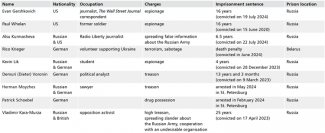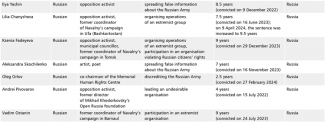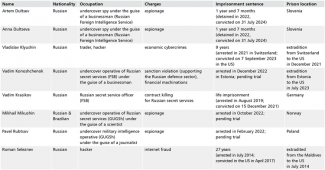Major East–West prisoner exchange
On 1 August, Ankara witnessed the largest prisoner exchange between the US and Russia since the Cold War. The exchange also involved Belarus, Germany, Poland, Norway, and Slovenia. On the Eastern side, 16 people were released, including three American citizens convicted of espionage in Russia (journalists Evan Gershkovich and Alsu Kurmasheva, and former marine Paul Whelan); four German citizens convicted in Russia and one in Belarus (Rico Krieger, who was sentenced to death for alleged terrorism); and eight Russian opposition activists and independent journalists convicted of treason or other crimes, including Vladimir Kara-Murza, Ilya Yashin, Oleg Orlov, and Lilia Chanysheva. On the Western side, the exchange included eight people, including Vadim Krasikov who was sentenced to life imprisonment in Germany for a political assassination. Russian citizens imprisoned in the US for crimes against security, such as cybercriminals, and Russian intelligence operatives who had been incarcerated in Slovenia. Notably, the two children of the operatives imprisoned in Slovenia, who had been in foster care since their parents’ arrest in 2022, also left the country. Additionally, Russian intelligence operatives were exchanged from Poland, including Pavel Rubtsov, who worked for Russian military intelligence under the guise of a Spanish journalist, and from Norway. The returning Russians were greeted at Vnukovo airport in Moscow, with an official ceremony involving the Kremlin regiment’s honour guard, attended by Vladimir Putin. The three Americans were welcomed at Andrews Air Force Base in the United States by President Joe Biden and Vice President Kamala Harris. The released Germans and Russians were greeted at Cologne/Bonn Airport by Chancellor Olaf Scholz.
Commentary
- The exchange was the result of long confidential negotiations, primarily between Washington and Moscow. US National Security Advisor Jake Sullivan confirmed that the West had wanted to include Alexei Navalny, whom Putin viewed as a personal enemy. Navalny’s sudden death in a penal colony in February might have taken place to prevent this kind of deal. One of the Kremlin’s priorities was to ensure the release of the FSB officer Vadim Krasikov from a German prison, where he was serving a sentence for killing the Chechen field commander Zelimkhan Khangoshvili in Berlin in 2019, who had been targeted by Russian security services. The fact that Putin has praised Krasikov in public suggests that his release is important. His release necessitated involvment made Germany and Belarus engaged in the prisoner swap, as the moves made in return for this included releasing from a Belarusian prison a German citizen who had been convicted in a fabricated trial on charges of terrorism and espionage for Ukrainian secret services. Turkey played a major logistical and organisational role. It was chosen as the venue for the exchange because it enjoys good political relations with all the parties concerned.
- From the standpoint of Russian domestic politics, the exchange demonstrates that Russian authorities do not abandon operatives who commit crimes on the Kremlin’s orders; instead, they treat them as national heroes. This serves not only as propaganda but also helps create a sense of impunity among such operatives, encouraging loyalty to the regime and their continued use in aggressive hybrid actions in Western countries. In turn, Moscow uses Western and Russian citizens as hostages. Since taking such hostages is straightforward—merely requiring the intensification of repressions against independent Russian activists and making false accusations against Western nationals in Russia—the Kremlin will likely feel encouraged to continue these practices. It is worth noting that there are currently about 760 political prisoners in the Russian Federation and around 1,400 in Belarus. As the group of liberated Russian citizens prepares to leave for the West, Russian propaganda will use this to discredit them in the eyes of the public, branding them as ‘Western spies’. At the same time, these individuals have the opportunity to strengthen anti-Kremlin exile communities and bring new energy to their activities.
- As regards the foreign policy dimension, the exchange is likely intended as a sign of Moscow’s alleged goodwill to seek de-escalation of its conflict with the West, primarily with the US. It also aims to encourage US leaders to engage in discussions with the Kremlin about, among other things, the potential political resolution of the war in Ukraine on Russia’s terms. The exchange can particularly be seen as a gesture towards the incumbent Biden administration, especially Vice President Kamala Harris, who is running for president. The United States has engaged in intensive efforts to achieve the release of Whelan and, above all, Gershkovich, and this issue has been a topic in the ongoing presidential campaign. The high-profile return of these individuals, and of the BBC journalist Kurmasheva) to the US will temporarily bolster the Democratic Party ahead of the November presidential elections as well as some members of the United States Congress.
- This marks a slight adjustment in Moscow’s stance, as so far Russian propaganda suggested that Moscow would prefer to see Donald Trump as the US leader. This shift may suggest that the Kremlin fears Trump’s unpredictability and is no longer confident that he will be willing to strike a strategic deal with Russia that would include major political and territorial concessions from Ukraine. Instead, Russia may be pinning hopes on the incumbent administration’s interest in ending the conflict and reaching a broader agreement with Moscow that could be presented as a success and leveraged in the presidential campaign. This reading of the Kremlin’s intent is supported by a recent remark by Valentina Matviyenko, chairwoman of the Federation Council and a member of the Security Council of the Russian Federation, who is close to Putin. She stated that Moscow was ready to engage in dialogue with Washington to discuss “global security” and “other issues that have arisen, that are in the interest of the entire world”. Previously, Russian officials had conditioned similar discussions on the inclusion of the Ukrainian issue, particularly the cessation of US arms supplies to Kyiv. The Kremlin may be attempting to stimulate a kind of competition between Democrats and Republicans over who can offer the best terms for a deal with Russia. Regardless, the swap might suggest that Russia is seeking ways to limit the costs and risks of escalating hostilities in Ukraine by more actively using diplomatic means to achieve its political objectives, without simultaneously renouncing the use of force or agreeing to an early ceasefire.
- The support Alyaksandr Lukashenka offered to Moscow facilitated the exchange. On 19 July, almost a month after the court’s decision, Belarusian authorities announced for the first time that Krieger had been sentenced to death on charges of terrorism and other crimes. It is possible that this draconian sentence, issued at the Kremlin’s behest, increased pressure on Berlin and prompted the German government to release the FSB officer Krasikov. On 30 July, Lukashenka pardoned Krieger. Formally, this did not mean that he would be released immediately, but he was to make the exchange possible.
- The German government asserts that the release of German citizens held in Russia and Belarus is proof of its close cooperation with the US. According to Politico, President Biden reportedly requested the release of Krasikov during a meeting with Chancellor Scholz in Washington in February this year. The decision was reportedly made following consultations within the government coalition, and Scholz informed the Christian Democrat opposition leader Friedrich Merz about the planned prisoner exchange. In Germany, however, the CDU and media commentators have voiced two major concerns regarding the prisoner swap. Firstly, there is apprehension that this deal may encourage Russian authorities to detain Western citizens in Russia to be later swapped for Russian secret service operatives. Secondly, it raises legal questions, as the Federal Prosecutor’s Office reportedly released Krasikov at the request of the Federal Ministry of Justice, thus setting a precedent in such cases.
APPENDIX
Prisoners released in Russia and Belarus


Prisoners released in the West





